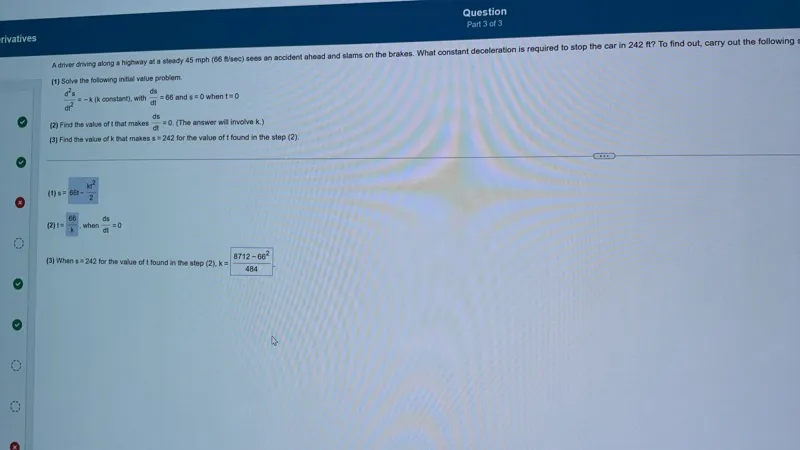Questions: Question Part 3 of 3 Derivatives (1) Solve the following initial value problem. The second derivative of s with respect to t is equal to -k (k constant), with the first derivative of s with respect to t equal to 66 and s equals 0 when t equals 0. (2) Find the value of t that makes the first derivative of s with respect to t equal to 0. (The answer will involve k.) (3) Find the value of k that makes s equal to 242 for the value of t found in step (2). (1) s equals 66t minus k times t squared over 2 (2) t equals 66 over k, when the first derivative of s with respect to t equals 0 (3) When s equals 242 for the value of t found in step (2), k equals (8712 minus 66 squared) over 484.

Transcript text: Question
Part 3 of 3
rivatives
(1) Solve the following initial value problem.
\[
\frac{d^{2} s}{d t^{2}}=-k \text { ( } k \text { constant), with } \frac{d s}{d t}=66 \text { and } s=0 \text { when } t=0
\]
(2) Find the value of $t$ that makes $\frac{\mathrm{ds}}{\mathrm{dt}}=0$. (The answer will involve $k$.)
(3) Find the value of $k$ that makes $s=242$ for the value of $t$ found in the step (2).
(1) $s=66 t-\frac{k t^{2}}{2}$
(2) $t=\frac{66}{k}$, when $\frac{d s}{d t}=0$
(3) When $\mathrm{s}=242$ for the value of t found in the step (2), $\mathrm{k}=\frac{8712-66^{2}}{484}$.





